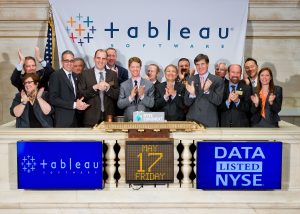Salesforce recently announced it will be acquiring Tableau, the data analytics and visualization software company, for $15.7 billion. What’s interesting to note is that Tabeau provides its customers with true software, meaning it’s on-premises. We all recall that Benioff famously declared that “Software is Dead” leading the charge to offer Software-as-a-Service or “SaaS” as its widely known today. So why the change of heart?
Well for one, Salesforce needs to ensure it will keep up its pace of growth for the foreseeable future. And with business data, analytics and visualization capabilities in high demand along with large software incumbents either providing their own business intelligence solutions or acquiring them, time was running out to get in the game.
Business intelligence has been and will continue to be a massive market opportunity. It is currently estimated at approximately $190 billion in terms of global big data and business analytics revenue. By 2022, that number is expected to reach $274 billion. Benioff couldn’t stand to miss out on the BI gold rush.
Taking a closer look at Tableau, the company’s growth over the last three to four years has been outstanding. In 2015, it had generated $653 million in revenue, by 2018, that number had just about doubled to $1.2 billion. The company deployed capital effectively reinvesting any cash earned back into the business while moderating annual losses.
Tableau was founded in January of 2003 by Christian Chabot, Pat Hanrahan and Christ Stolte in Mountain View, California. At the time, they were researchers at Stanford University in the computer science department specializing in visualization techniques. Along the way, a new headquarters was set up in Seattle, Washington and went public in 2013. In 2016, the company appointed Adam Selipsky as president and CEO replacing co-founder Christian Chabot as CEO.
Commenting on the acquisition, Marc Benioff states, “"We are bringing together the world's number one CRM with the number one analytics platform. Tableau helps people see and understand data, and Salesforce helps people engage and understand customers. It's truly the best of both worlds for our customers—bringing together two critical platforms that every customer needs to understand their world."
The merger and integration is not without its challenges. As mentioned, Salesforce provides SaaS to its customers while Tableau is traditional software. The combined company’s marketing and sales strategy and execution will have to be reworked and the thousands of professionals in these departments will need time to adjust. Moreover, as in any merger, duplicative areas such as human resources, finance, marketing and security jobs will be eliminated.
Challenges aside, Salesforce is now a major player in the BI game, competing with Microsoft, Google and others. Benioff has secured a horse to ride on for capturing share of the $274 billion market.
























